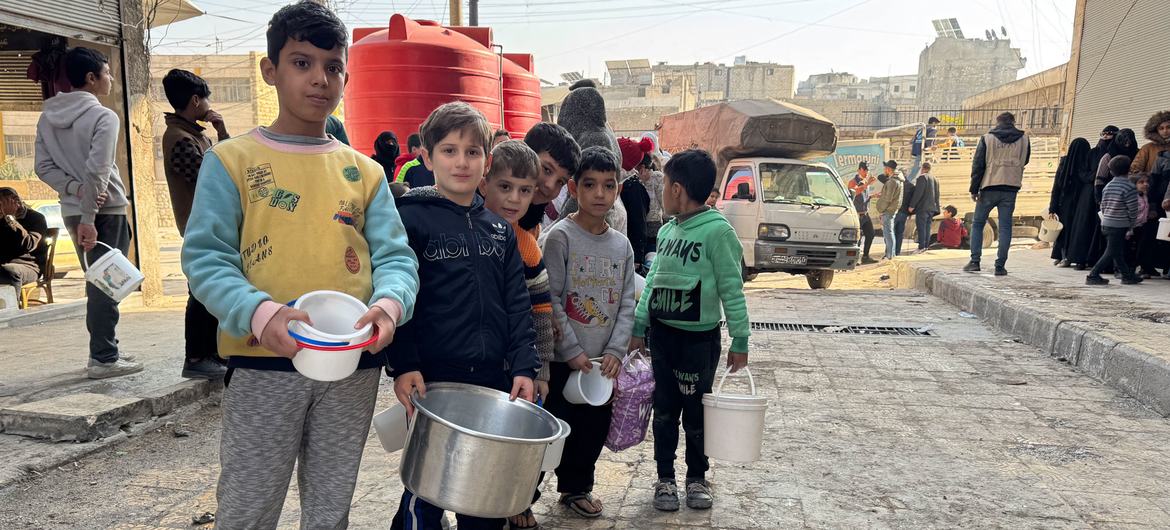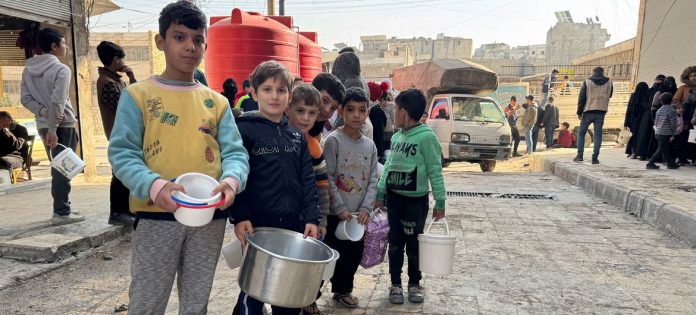The UN Independent Commission of Inquiry on Syria also called on Monday for all parties to prioritize the protection of civilians as the country grapples with a worsening humanitarian crisis and ongoing violence, including in the Golan.
Special Envoy Geir Pedersen arrived in Damascus over the weekend, and on Sunday held meetings with key figures including leader of the new administration, Ahmed al-Sharaa – who formerly went by the nom de guerre, Mohammad Al-Jolani – and Mohammed al-Bashir, prime minister of the caretaker Government.
Mr. Pedersen emphasized the need for a credible and inclusive Syrian-owned and led political transition based on the principles of Security Council resolution 2254 (2015).
“The United Nations is committed to rendering all assistance to the Syrian people,” he said, according to statement from his office.
UN chief welcomes commitment to protect civilians
In response to the fast-changing developments in Syria, the UN chief despatched UN Emergency Relief Coordinator Tom Fletcher to also hold discussions with Mr. al-Sharaa and Mr. al-Bashir.
In a statement released late on Monday, António Guterres welcomed the caretaker Government’s commitment to protect civilians, including humanitarian workers.
“I also welcome their agreement to grant full humanitarian access through all border crossings; cut through bureaucracy over permits and visas for humanitarian workers; ensure the continuity of essential government services, including health and education; and engage in genuine and practical dialogue with the wider humanitarian community.”
Prison visit
Mr. Pedersen also visited the notorious prison complex of Sednaya, where thousands of Syrians were detained and tortured by the former regime, prompting many families to go in search of missing relatives in recent days. While there, he met mothers of some of those displaced, people newly liberated and lawyers handling some of the cases now pending.
He also met with a delegation of the Syrian Negotiations Commission (SNC) comprising its different components of the SNC, including military representatives who have taken part in the recent military operations in Syria.
Fighting continues
Meanwhile, fighting continues in the northern, eastern and northeastern parts of the country, while Israeli forces have advanced beyond the zone established by the May 1974 Agreement on Disengagement for the first time in 50 years, reportedly carried out more than 500 airstrikes since the overthrow of the Assad regime.
United States forces also conducted dozens of airstrikes on alleged ISIL – or Dae’sh – terrorist group targets since 8 December, while reported airstrikes by Türkiye continued against targets linked to United States-backed Syrian Democratic Forces in the northeast.
The UN Human Rights Council-mandated Independent Commission of Inquiry on Syria called on all parties to the conflict in Syria to protect civilians, and to treat those who have laid down their arms humanely.
“The caretaker Government in Damascus as well as other parties in the Syrian conflict should ensure that their forces are abiding by their stated commitments to prevent violence and protect civilians, in particular the most vulnerable communities,” said Commission Chair Paulo Sérgio Pinheiro.
Protect evidence
The Independent Commission also stressed the need to safeguard evidence and crime scenes, including mass grave sites, for forensic documentation and analysis, as well as to help ensure future accountability.
Thousands of civilians were killed after civil conflict erupted in the country in 2011 and countless more suffered gross human rights violations and abuses, including enforced disappearance.
Commissioner Hanny Megally underscored the gravity of the situation, stating:
“Syrians deserve justice after near 14 years of brutal war, where almost every crime listed in the Rome Statute has been committed. Perpetrators should be brought to justice, especially those most responsible, and Syrians must be in the lead in shaping the justice and accountability response.”
“Full justice for victims and survivors will undoubtedly need to be broader than trials and they should be allowed to pursue their demands for truth, reparations and legal and institutional reforms,” he emphasised.

Children queue for hot food in Aleppo, Syria.
Review sanctions
The humanitarian crisis remains dire, with over one million displaced since late November and 17 million in urgent need of assistance. Capacity to support those newly displaced, as well as those returning, is overstretched and more support from the international community is urgently needed.
The Independent Commission called on all Member States to support aid efforts, calling for the review and suspension of existing sanctions regimes, to ensure they are not impeding humanitarian efforts.
“As we have seen, sanctions cause disproportionate harm to the poor and most vulnerable, and now is the time to give Syrians the chance to rebuild their own country,” said Commissioner Chair Pinheiro.
Leading relief efforts
In response to escalating needs in Syria, UN agencies and humanitarian partners are delivering vital assistance, including food, water, cash, tents, blankets, medical teams, and critical supplies.
UN Emergency Relief Coordinator Tom Fletcher said: “Behind the drama of what we are seeing on our screens are millions of human lives — people who want dignity, security, justice, and opportunities for their families,” he said at the Masnaa border crossing between Syria and Lebanon.
“And that’s who we are here to support.”
Restoring critical services
Over the weekend, the UN Children’s Fund (UNICEF), in collaboration with the Syrian Arab Red Crescent (SARC) and the International Committee of the Red Cross (ICRC), conducted a joint mission to the Tishreen Dam in Aleppo governorate to enable urgent repairs.
Hostilities near the dam last week caused extended power outages, disrupting water and other essential services relied on by millions of people in the area.
UNICEF also secured fuel for the dam’s backup generator, allowing for safe drainage and safeguarding water supplies for affected communities.
Safe passage vital
“According to partners, and as of [Sunday], over 40,000 displaced people are staying in and around collective centres across northeast Syria,” UN Spokesperson Stéphane Dujarric told reporters at the regular press briefing in New York.
He reiterated the call from UN humanitarians that those fleeing fighting must be allowed to do so safely and voluntarily return when the situation allows.
“Whether they leave or stay, people must be protected and able to access essential supplies for their survival.”

